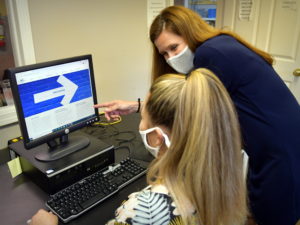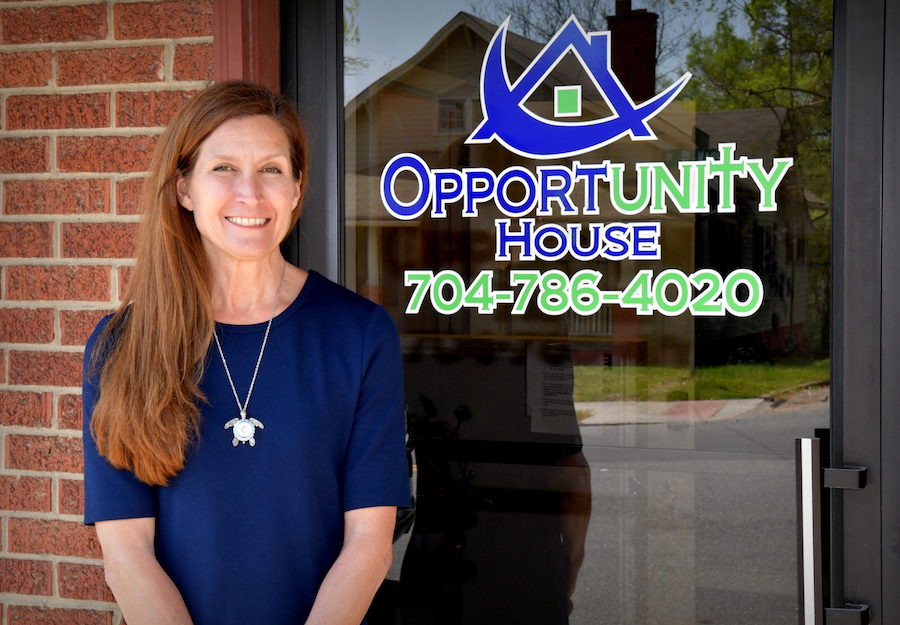Exactly Where She’s Supposed to Be
By Melanie Raskin
Laura Tolbert, MSN, RN, loves FROGs, those fully-rely-on-God moments that flip the switch and spark creativity, synergize people, galvanize change and ultimately transform lives – for good.
That’s how she sees her journey as a faith community nurse, a specialized practice of volunteer and paid licensed, registered nurses in faith communities and organizations that combines spiritual care with health care to prevent or minimize illness for overall well-being. In the health care field since 1988, she served in cardiac nursing, attained her master’s in nursing administration, worked in case management and transitioned into school nursing and public health.
After volunteering at her church’s free Latino clinic, she took the next step and moved into faith community nursing. Since 2013, Tolbert has been firmly poised at the intersection of need and hope for the guests at Opportunity House in Cabarrus County. The nonprofit provides resources to meet the physical, mental, spiritual and emotional needs of homeless and disadvantaged people, with the added goal of addressing the root causes of homelessness. It’s a day shelter providing meals, showers, clothing, computer lab, spiritual enrichment, tents and backpacks for those who are chronically homeless. And it’s busy.
On one average day, Tolbert followed up on a patient, set therapy and primary care appointments, arranged substance use and trauma group meetings, helped a relapsed guest get back on track with his sobriety, handled a medication issue, counseled a patient about blood sugars, called the Social Security office for a guest, persuaded the pharmacy to deliver prescriptions, straightened out a referral problem, found a computer lab resource for a woman working on her resume, and prayed with someone panicked and overwhelmed by poverty to receive peace, guidance and to feel God’s presence and comfort.
It’s a big job, and Tolbert loves every minute of it.
“The best part is that I know 100% there is no other place on earth I’m supposed to be than right here,” she says. “I like getting people to see themselves as more than what they are right now, more than their mistakes, and reminding them that they are loved despite anything they’ve done. We can pray and talk about where their hope is coming from and, together, grab hold of that hope.”
Her vision of a healing of all things for the people in her care – both medical and spiritual – perfectly sums up faith community nursing.
Faith Community Nursing: Whole Person Care
Faith community nursing was created in the 1980s by Granger Westberg, a pioneering Lutheran clergyman who moved from the church pulpit into hospital chaplaincy and education to promote the integration of religion and medicine, with the end goal of what he called “whole person care.” To Westberg, nurses were crucial to this revolutionary approach to healing. With skills and services as varied as the needs of their communities, 17,000 faith community nurses around the world today advise and educate on health, make at-home and in-hospital visits to patients, refer people to community resources and health services, develop support groups, coordinate and train volunteer teams, and provide health screenings.
Atrium Health, which recently joined forces with Wake Forest Baptist Health, has had a vibrant faith community nursing program since 1997. Atrium’s mission of health, hope and healing for all dovetails perfectly with the work of FaithHealthNC, according to Pam Spach Hurley, MOL, BSN, RN, director of Faith Community Health Ministry in Charlotte. She’s especially excited about the impact of the union with FaithHealthNC and the powerful CareNet system, a network that has provided high-quality outpatient counseling services via regional centers across North Carolina since 1972 as the largest hospital-based program of its kind in the nation.
“The exciting thing about health ministries is that they meet people where they are,” she says. “The health care industry spends a lot of time providing in-patient acute clinical care for people, and yet it impacts just 20% of their overall health. Most health impacts are outside the doctor’s office or hospital: it’s 10% environment, 30% behaviors and 40% socioeconomic factors. Faith community nursing can affect those community impacts – both the medical needs of cancer; stroke; heart, kidney and lung disease; suicide; diabetes; Alzheimer’s and accidents; as well as contributing behaviors and the root spiritual, relational and socioeconomic needs.”
Hurley points out that faith community nurses are highly experienced, long-term behavior change specialists who support, encourage and guide patients. Often with more than 20 years of experience in the field and working hand-in-hand with churches, shelters, group homes, faith organizations and agencies, they build trust and relationships that can impact generations: parents, children and grandchildren.
“Faith community nurses are trained to help people be the best possible steward of themselves,” she explains. “When patients are in and out of the hospital setting and moving back into the real world, these nurses are right there, doing life with them.”
Hurley feels this nursing specialty is in the right place at the right time as health care moves from volume-based outcomes and care to value-based outcomes and care. “Faith community nursing has always been in that value space, so now is our time. These nurses impact health care by helping those patients who repeatedly visit the hospital ER or doctor by taking care of things when and where it really matters – in the community.”
Tolbert agrees: Professionals like her are vital to communities, especially now.
“It’s our specialized job to look beyond what’s on the outside and dig deeper,” she points out. “Assessment, evaluation, planning and education are critical. If I can prevent one stroke, I’ve saved the health care system three times my annual salary. Prevention is much cheaper than care and cure. If there was a faith community nurse in every church for just a few hours a week, imagine where we’d be in terms of overall health and well-being. That’s a lot of prevention.”
Called to Do – and Be – More
But impacting health care is bigger than just taking blood pressures and making referrals. For Tolbert, it’s moving Opportunity House’s mission to address the root causes of homelessness from words on a piece of paper to real-world practice.
“While it’s great to try to help people control their blood pressure, I learned that when you’re having to eat food from a shelter or out of a can in a tent, there’s just no way to control those measures,” she says. “We have to figure out how to move people into stability, but you can’t do that until you understand the causes of homelessness. Providing food, clothing and showers is important, but it doesn’t move anyone into housing. There are bigger barriers to overcome, including substance abuse, mental illness, learning disabilities and generational poverty – worrying about your next meal or how to make this month’s rent.”
 To Tolbert, faith community nursing at its best is creative, committed, collaborative … and unstoppable. Since 2014, she has worked to align with like-minded partners who share Opportunity House’s quest to move homeless people who have lived through years of neglect, abuse, poverty, and physical and mental health challenges into stability. The miracle is, it all came together in the last year, during COVID-19. But then again, maybe it’s not that miraculous. The pandemic has shined a bright and sobering light on the depth and breadth of need in communities. It is the cliff that a lot of organizations have plunged over, straight into thin air, which means it’s also a time that has called a lot of organizations to soar.
To Tolbert, faith community nursing at its best is creative, committed, collaborative … and unstoppable. Since 2014, she has worked to align with like-minded partners who share Opportunity House’s quest to move homeless people who have lived through years of neglect, abuse, poverty, and physical and mental health challenges into stability. The miracle is, it all came together in the last year, during COVID-19. But then again, maybe it’s not that miraculous. The pandemic has shined a bright and sobering light on the depth and breadth of need in communities. It is the cliff that a lot of organizations have plunged over, straight into thin air, which means it’s also a time that has called a lot of organizations to soar.
Partnerships with the Cabarrus County Mental Health Advisory Board, AYA House, Cooperative Christian Ministries, Habitat for Humanity, Veterans Administration programs, multiple mental health and substance use providers, primary care providers and banks resulted in needs assessments, analyses … and inspiration. CARES Act and other funding turned inspiration into reality, paying for salaries, housing and medical needs. Opportunity House discovered it wasn’t enough to connect guests to the resources they needed: an ID, a free clinic for primary care and substance use treatment support. Resources are nothing if a person doesn’t have a stable place to go; all gains would be lost.
So, the reentry and transitional housing program for people completing substance use treatment or incarceration was born: the Cabarrus County Community Housing Program. Opportunity House provides the programming and AYA House, a nonprofit transitional housing program in Cabarrus County, provides the beds. Opportunity House, with its many programs, was the logical place to start, because it was just three blocks from the detention center. Inmates work with a peer support specialist their last three months of incarceration before moving to AYA House. The team also developed wrap-around services for the men as well as for chronically homeless people who wanted to move into stability. Currently, Opportunity House has placed seven of the eight men in AYA House – three came through the new housing program. Still more are participating in the program in other ways.
Faith: What FROG is All About
To Tolbert, the faith community nurse, fully relying on God means trusting that she’ll be placed in the right and perfect place at the right and perfect time to do her right and perfect work. She has found her place, her time and her calling with Opportunity House. But it’s much bigger than just nursing and health care.
To Tolbert, faith community nursing is about improving lives by changing paradigms, retooling systems, establishing partnerships, connecting people, creating programs, and praying and persevering. And praying and persevering some more. It is having faith in a vision of true wholeness – and letting those FROG moments guide the work.
“We had no budget for this new housing program, no funding, and still, we’ve been able to piece it together,” she concludes. “This whole thing is totally God’s work. I wouldn’t change a thing with COVID because it got us on the map. And we’re not going to get off that map. It’s been truly an act of faith, and I’m so thankful.”

